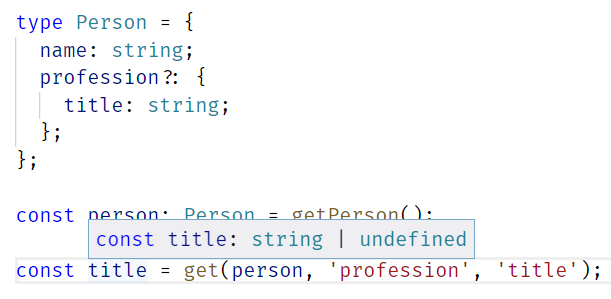get-optional
Typesafe utility functions for getting a property value that's deep in a structure with possibly nullish intermediate values.
Includes type definitions for TypeScript and Flow so that the validity of arguments can be checked and return value inferred.

Installation
npm i get-optionalBasic usage
// Or:var get = get; ; // => 'Hello World'API
get(object, key1, key2, key3, key4, key5)
Gets the value at a given path.
Path must consist of 1-5 string keys.
If one of the keys in path (before the last key) points
to a null or undefined value, undefined is returned instead.
Example
const object = a: b: null c: value: 42 ; ; // => 42; // => undefined; // => nullgetWithDefault(defaultValue, object, key1, key2, key3, key4, key5)
Gets the value at a given path.
Path must consist of 1-5 string keys.
If one of the keys in path (including the last one) points
to a null or undefined value, defaultValue is returned instead.
Example
const object = a: b: null c: value: 42 ; ; // => 42; // => 'default'; // => 'default' // The same expressed with the proposed optional chaining and nullish coalescing operators:object?a?c?value ?? 'default'; // => 42object?a?b?value ?? 'default'; // => 'default'object?a?b ?? 'default'; // => 'default'nth(list, index)
Gets the element at a given index of an array.
If the index is out of bounds (larger than the length of the array),
undefined is returned instead.
Example
const list = 'first' 'second' 'third'; ; // => 'second'; // => undefinednthWithDefault(defaultValue, list, index)
Gets the element at a given index of an array.
If the index is out of bounds (larger than the length of the array)
or if the value to be returned is undefined or null,
defaultValue is returned instead.
Example
const list = 'first' 'second' 'third'; ; // => 'second'; // => 'default'head(list)
Gets the first element of an array.
If the array is empty, undefined is returned instead.
Example
const list = 'first' 'second' 'third'; ; // => 'first'; // => undefinedheadWithDefault(defaultValue, list)
Gets the first element of an array.
If the array is empty, defaultValue is returned instead.
Example
const list = 'first' 'second' 'third'; ; // => 'first'; // => 'default'method(obj, key1, key2, key3, key4, key5)
Gets the method at a given path.
Path must consist of 1-5 string keys.
The returned function will have this context bound to the second
to last value in the chain, i.e. to the object that contained
the function.
Always returns a function, so it's safe to chain calls method(..)(..).
If one of the keys in path points to a null or undefined value
or if the last value is not a function, a
no-operation function noop is returned instead.
Example
const container = counter: value: 1 { thisvalue += amount; } ; 2;// container.counter.value === 3 // Doesn't do anything because therer's no "subtract" method.2;// container.counter.value === 3Caveats
- The type definition for Flow doesn't allow accessing class or interface
properties with
get/getWithDefault. Try to use types defined withtypedeclarations instead, or cast the class instance to an indexable type before using (see tests/typings/testbed/flow-should-pass/get.js for an example). - No more than 5 keys are supported, unlike in most other similar implementations where any number of keys can be passed as the path. This is done to match the runtime behaviour with the static type definition and for better runtime performance.
- This library is NOT meant to be used for accessing dynamic property paths.There are other libraries that handle that use-case better and safer, the focus of this one is in type safety and performance, not flexibility.// Don't do this;
Other tools like this
- lodash.get is a well-established and flexible utility function for safe property access.
Lodash is also such a common dependency that you probably already have it, at least as a
transitive dependency.
I recommend it if you aren't using TypeScript or Flow or you aren't so strict about your static types. - typesafe-get seems very similar to get-optional for TypeScript users. I can't say much about it because I haven't personally used it (I started developing this one without knowing there was a typesafe alternative already). You might want to check that out anyway.
- Optional chaining operator is hopefully coming to the language itself at some point and there's already a Babel plugin for it. The spec might still change, though, and some of the tools you are currently using might not support it.
